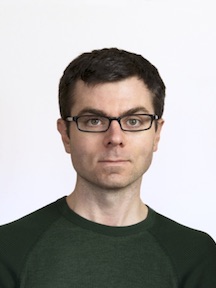By Emma Forgione
The liberal arts has a wonderful way of attracting people whose intellectual interests are a smorgasbord of different things. You have your tap dancing mathematicians, your poetic political scientists, or your friends who double major in accounting and circus arts. Well meet Greg Edwards, an accomplished musical theater lyricist and a Technical Program Manager at Google. Edwards is an inspiring ΦBK member who truly used his liberal arts degree to its fullest and pursues all of his interests professionally, despite their seemingly contrary nature.
Edwards attended Yale University and joined ΦBK in 2004, a year before he completed a degree in theater studies and computer science. He moved to New York to peruse both of his dreams, working two days a week for the technical side of a hedge fund called D.E. Shaw, and five days a week writing for musical theater. In his professional writing career, he has been awarded the BMI Foundation’s Harrington Award for Creative Excellence, a Broadway World Award for Best Off-Broadway Show, a Drama Desk nomination, and more. After nine years in the tech industry, he started working at Google and explains how his position there fills a similar emotional niche that his writing does. “What I want to do is tell stories and support myself through storytelling,” he says. “I’m working on technologies that my friends and family use, and I get to see the world.”
In addition to Google and composing lyrics, he writes plays, essays, a travel blog, and also creates video games. His first game, Jessica Plunkenstein and the Dusseldorf Conspiracy, was one of the New York Times Best Adventure Games, and he is due to release a new game that he has been writing for ten years.
He reflects upon how the scientific part of his brain also influences his writing. For example, Edwards attended the BMI Lehmen Engle Musical Theater Writing Workshop, acclaimed for their origins of great composer/lyricist teams such as Robert and Kristen Lopez, Lynn Ahrens and Stephen Flaherty, and more. He saw his computer science brain at work when making sure all of his lines had perfect rhyme and perfect scansion. “If you’re already doing something precisely, be precise,” he says. It also plays into his work ethic, in terms of continuously striving to improve his writing through constant practice and repetition.
“One of the things that makes this career so unique, challenging, fill in the blank, is all you can control is the quality of your work,” Edwards says. “The line and/or lie I tell myself is, ‘success is a combination of skill plus luck.’ You have to have the right thing at the right time. And while you can gain luck by just repeating something over and over until you happen to do it at the right time, you can’t gain skill. So you have to make sure you write well, write often, and hope that what you put out happens to click in a particular zeitgeist.”
Edwards is an incredible proponent of the liberal arts and organizations like Phi Beta Kappa that have, at their core, the values of a strong work ethic and a hunger for learning.
“You can sit down in an afternoon and learn how to rhyme and scan, and learn the quote on quote formula for a musical,” Edwards says. “A lot of it is carpentry and technique, but in terms of having the heart and the basis of knowledge to go on to create the writing, that’s where I feel liberal arts really comes in. You learn a whole lot about a bunch of different things, you learn how to think critically, you learn perspectives that aren’t your own, and synthesizing all of this gives you a great big repertoire to pull from.”
The liberal arts gives you the confidence to pursue all of your passions, and Edwards leads by example, devoting his life to storytelling on stage or on a really, really small screen.
Emma Forgione (ΦBK, Muhlenberg College, 2018) is a recent graduate in English and theater with a minor in creative writing from Muhlenberg College in Allentown, Pennsylvania. Muhlenberg College is home to the Pi of Pennsylvania chapter of Phi Beta Kappa.




